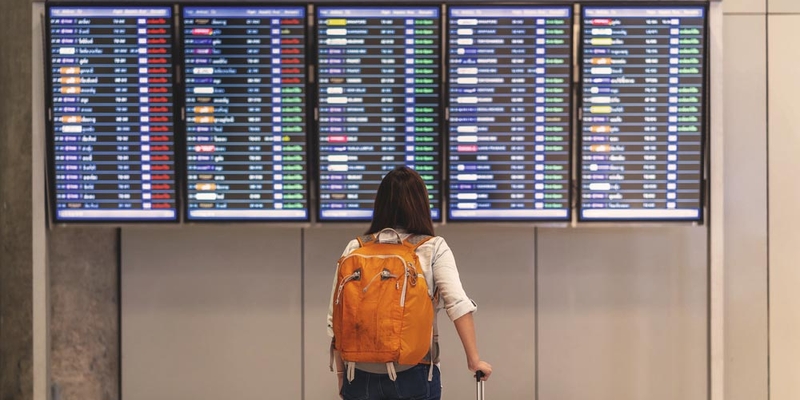
If you are not redirected within 30 seconds, please click here to continue.
Samedi: 10h – 16h HAE

If you are not redirected within 30 seconds, please click here to continue.
If you are not redirected within 30 seconds, please click here to continue.
One-third of Canadian plane travellers have changed plans due to airport delays: survey

- 35% of potential plane travellers in Canada have changed their travel plans as a result of ongoing airport delays.
- 78% of those who have had to change travel plans due to airport delays intend on purchasing travel insurance this year.
- 57% of those planning to travel by plane say they’ll purchase additional travel insurance coverage, such as trip cancellation or trip interruption, while only 34% planning to travel by car say the same.
After a two-year hiatus, the demand for travel has officially returned in Canada. As of June, the number of Canadians returning from abroad by plane was more than 15 times greater than the year prior, largely due to an easing of COVID-19 travel restrictions. However, the recent surge in travellers has been met with short-staffed airlines — and as a result — flight delays, long lines, and lost luggage.
According to a recent Leger survey conducted on behalf of RATESDOTCA and BNN Bloomberg, 35% of potential plane travellers have made changes to their travel plans due to delayed or cancelled flights and long lines at airports. And a whopping 78% of those who’ve had to make changes to their travel plans due to airline complications intend to purchase travel insurance for their next trip for good measure.
With delays and cancellations expected to continue for months, some Canadians are thinking twice before setting off without adequate coverage.
One-third of potential plane travellers changed travel plans due to airport delays
Most Canadians plan on travelling this year by plane or car (54%). However, one third (35%) of potential plane travellers have made changes in their travel plans due to delayed or cancelled flights and long lines at airports. Of this third, 56% have delayed travel plans, 18% have changed their destination, and 13% decided to drive somewhere instead.
“We are seeing many travellers choosing to travel by car or staying within Canada, so it is important to understand there is still a need for travel insurance, even when staying closer to home,” Louiselle Landry, business development manager at TuGo Insurance, said in an email to RATESDOTCA.
While only 46% of all trip planners are considering travel insurance, the intent to purchase insurance is significantly higher among those who have postponed or redirected their trips to account for the likelihood of delays and cancellations. In fact, 24% of those whose travel plans were interrupted by these delays say that while they don’t usually buy travel insurance, recent airport issues have caused them to reconsider.
78% of those who changed travel plans due to delays intend on purchasing travel insurance this year
The vast majority of travellers who have had to make adjustments to their travel plans say they are opting for travel insurance for their next trip (78%). Yet, the percentage of those who plan to purchase it doesn’t depend on income level. This could be because travel insurance is a relatively affordable product for those who can afford a vacation.
According to the RATESDOTCA travel insurance quoter, the lowest travel insurance premium for a 30-year-old single female in Ontario with no pre-existing health conditions is just $16.32 for a week-long trip to the United States. Compared to the costs incurred from an unexpected medical emergency abroad, travel insurance can be a minor expense, depending on the non-refundable expenses paid prior to your departure, your health, and other factors.
“It’s important to know not all plans provide the same coverage, so you may want to look for travel insurance that specifically meets your needs,” says Landry. “Some additional plans include coverage for unstable pre-existing medical conditions or trip cancellations and interruptions.”
However, the extent of coverage you opt for will be reflected in your premium. “Emergency medical insurance premiums vary based on the traveller’s age and trip length,” says Landry, “while trip cancellation and interruption vary based on trip cost.”
Majority of those planning to travel by plane say they’ll purchase extra travel insurance coverage
While 50% of Canadians plan to purchase additional travel insurance, the percentage is higher among those planning to fly versus drive (57% versus 34%).
However, unlike the difference we saw in basic travel insurance intent between those who changed their travel plans and all trip planners (78% versus 46%), purchase intent for additional coverage is relatively similar for those who have changed their plans and those who have not (59% versus 54%).

Additional travel insurance can offer perks that a basic policy might not. Trip cancellation and trip interruption insurance, for example, cover the full cost of your trip if it’s cancelled, delayed, or interrupted for reasons out of your control.
While trip cancellation insurance is valuable before your departure date, trip interruption coverage protects you during your travels. This additional coverage is great for those who already have medical coverage in place but are looking for more peace of mind. And if you’re looking for a bundled policy that covers any travel scenario, including loss or delay of luggage, an all-inclusive policy is the best way to go.
Despite the selection of travel insurance add-ons available, 38% of travellers don’t plan on purchasing additional coverage this year. For the 32% of that cohort who plan to travel by plane and skip out on travel insurance altogether, the risk of having to bear the cost of flight cancellations, cancelled accommodations, and lost luggage is greater.
Weighing the cost of travel insurance and the total cost of a vacation or medical emergency is an important part of trip preparation, particularly for those who are flying internationally. Factoring the cost of insurance into your budget before planning a departure is a good way to guarantee a safe and relaxing trip.
Don't waste time calling around for travel insurance
Use RATESDOTCA to shop around, and compare multiple quotes at the same time.
Finding the best travel insurance coverage has never been so easy!
Get money-saving tips in your inbox.
Stay on top of personal finance tips from our money experts!










